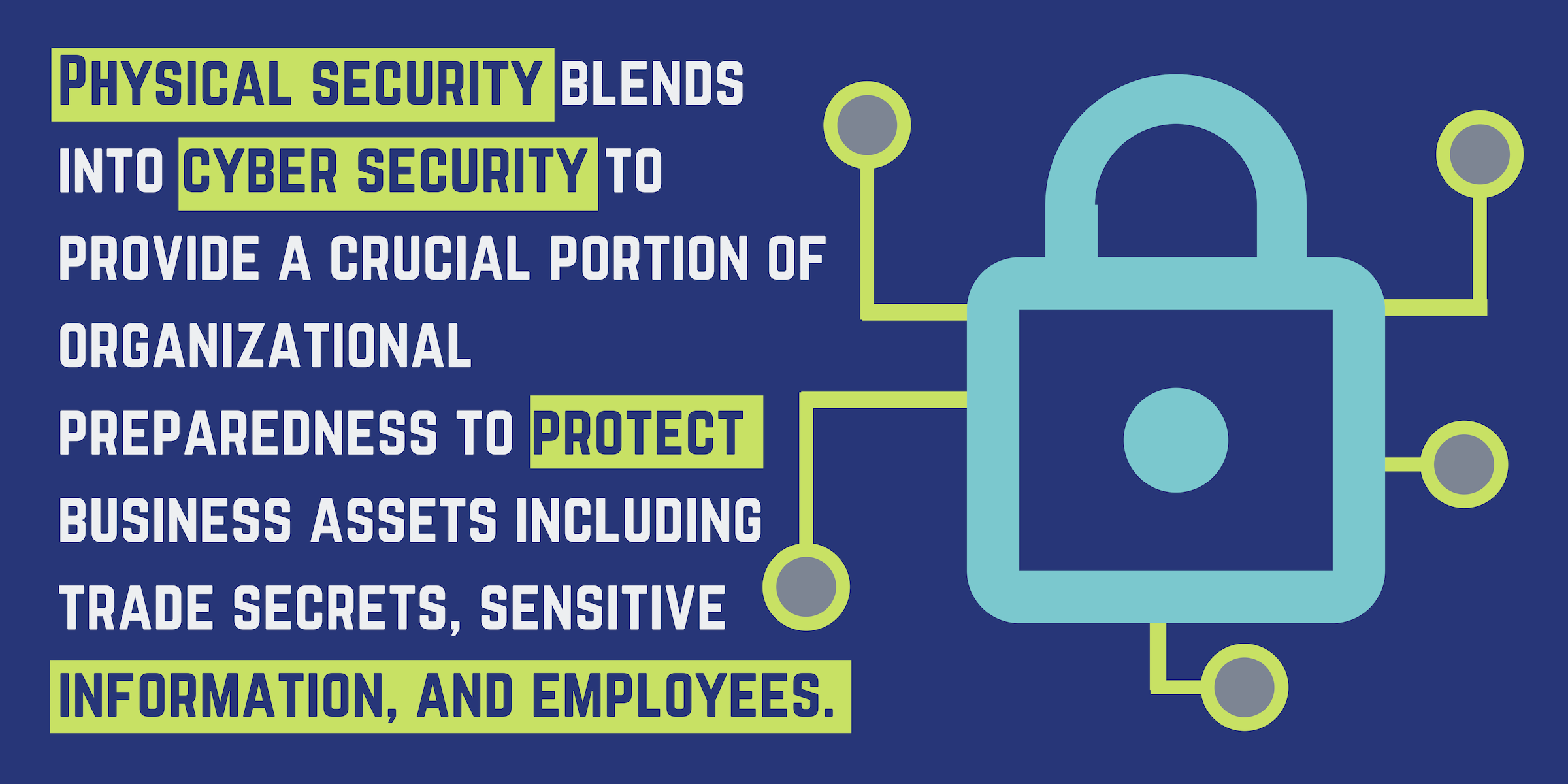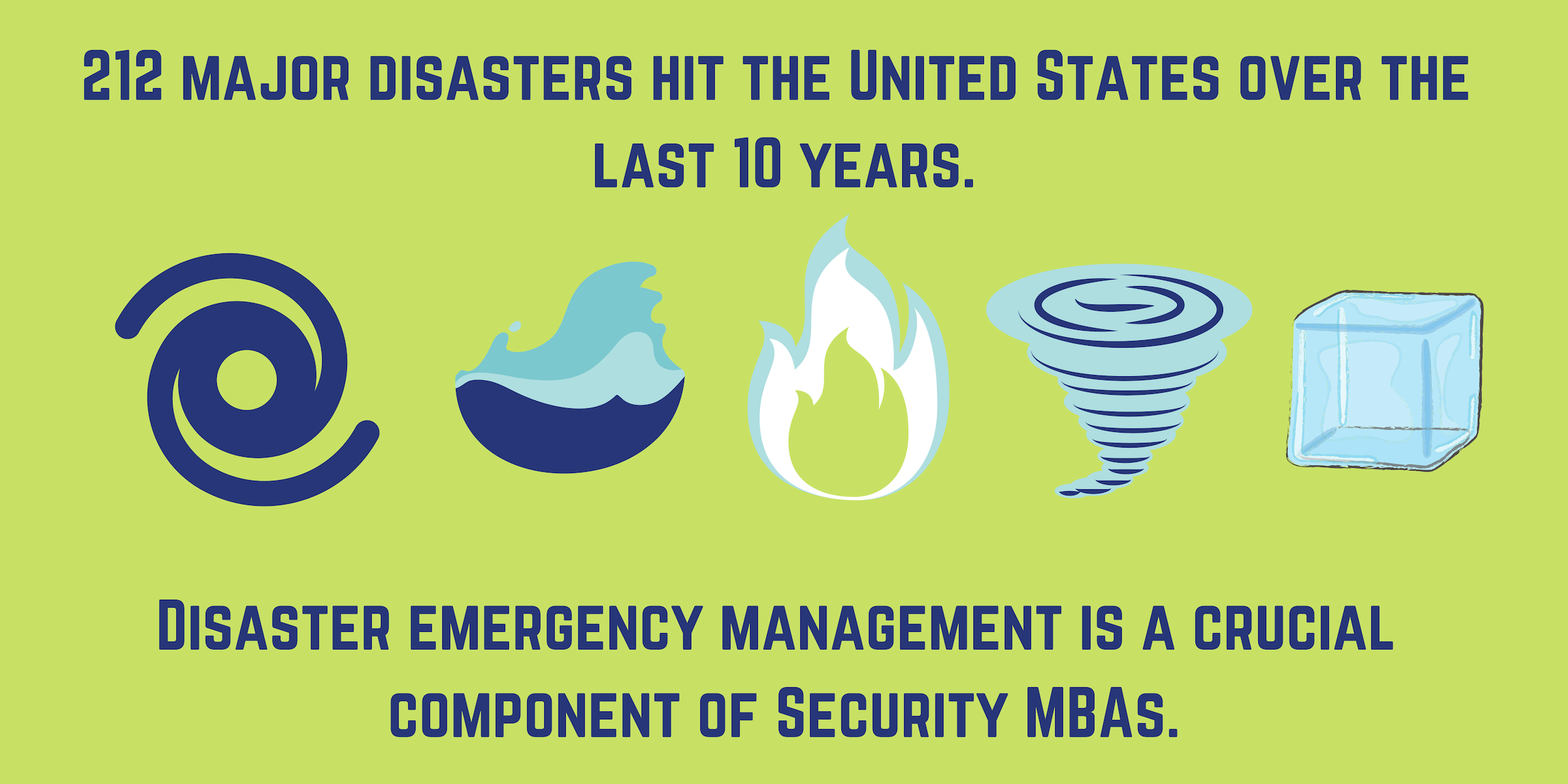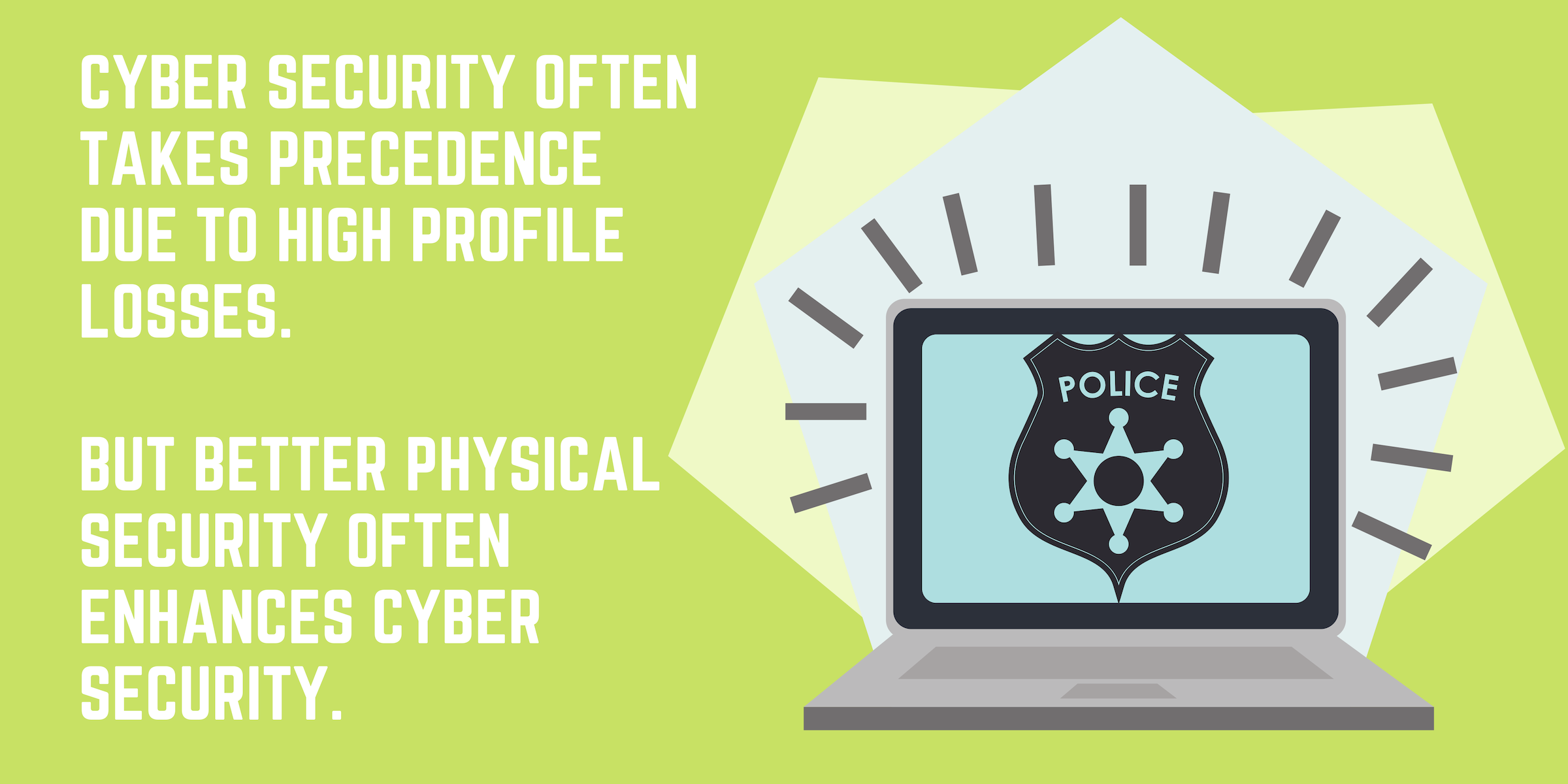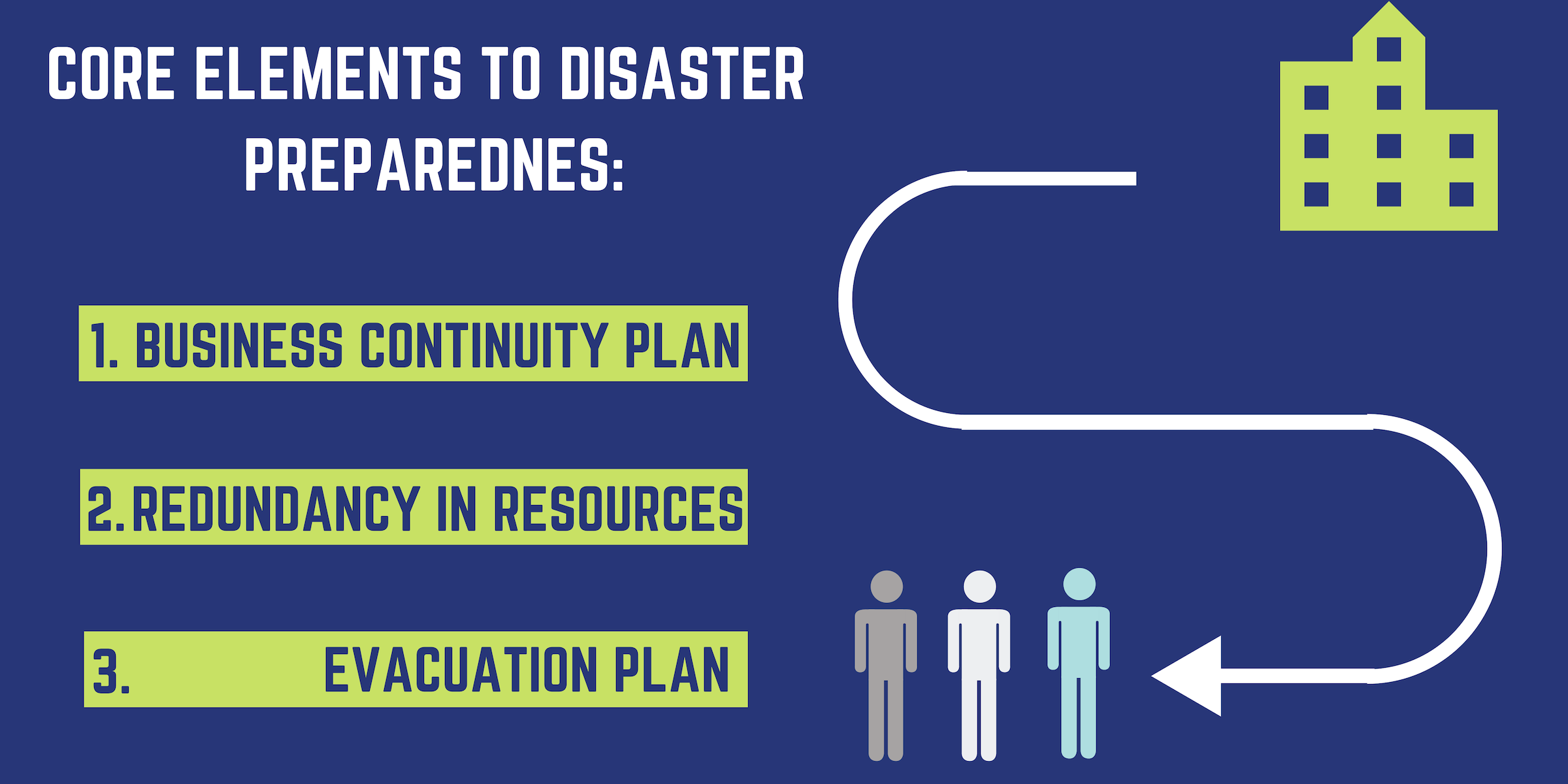![]() Law and security organizations are some of the largest employers in nearly every city and town. In many state capitols or county seats, a majority of professional jobs may be tied to regulatory agencies, the court system, and physical security.
Law and security organizations are some of the largest employers in nearly every city and town. In many state capitols or county seats, a majority of professional jobs may be tied to regulatory agencies, the court system, and physical security.
While cyber security has gained a great deal of attention due to high profile breaches in recent years, it’s noteworthy that physical security is still one of the most central components of a solid cyber security plan. Additionally, a range of unique jobs specific to law and security management are available to those with the educational background and expertise.
While we may live more of our lives online than ever before, physical security and the management of safety-enhancing resources is just as crucial as ever. And this is why a range of master’s in business administration programs offer degrees in security or law.
Think you might be interested in an MBA in law or security? Be sure to check out MBA Central’s ranking of the best online law enforcement and security MBA programs today! Interested in finding out what law and security MBAs are like, and what careers they can prepare you for? Scroll below for more.
Security MBA Resources
- The Best Online Law Enforcement and Security MBAs
- The Best Online Cyber Security MBAs
- The Most Accelerated Online MBAs
- The Best No-GMAT Online MBAs
- The Best Online MBA Programs
What is a Law and Security MBA?

Law and Security MBAs are first and foremost master’s in business administration degrees. These are professional master’s-level degrees that provide a range of coursework in common business and management disciplines.
Called by a range of related names, law and security MBAs are one type of MBA concentration. While most MBA programs provide a similar range of core courses, students may elect to pursue a concentration or focus area in many programs. This cluster of 3-5 courses helps students to specialize in a way that helps build expertise in one area of business or management.
Common names for a law and security mba concentration may include:
- Homeland Security MBA
- Homeland Defense MBA
- Military MBA
- Law Enforcement MBA
- Security Management MBA
- Criminal Justice MBA
- Among Others
The core MBA courses offered in a law or security MBA are listed below:
- Operations and Logistics Management
- Microeconomics
- Finance
- Organizational Strategy
- Accounting for Decision Making
- Business Analytics
- Leadership
- Among Others
Once students have worked through some of the core courses in their MBA course of study, they begin to take specialization courses. Common specialization courses in law enforcement and security MBAs (and related MBA types include):
- Criminal Justice
- Juvinile Offendors
- Law Enforcement
- Drug Enforcement
- Forensic Sciences
- International Crime and Terrorism
- Transportation
- Security Risk Management
- Network Security
- Physical Security
Future students in law enforcement and security MBA programs should be aware of the difference between an executive and a traditional MBA. While executive MBAs are extremely valuable resources, few executive MBA programs have specializations available to students.
The key difference besides lack of specializations is that executive MBAs are generally only open to those with 5 or more years of managerial experience. Executive MBAs skip many introductory topics and move into advanced topics in general business courses.

Traditional MBAs typically take longer to complete, include more courses, and offer specializations. These programs are geared towards professionals earlier in their career who are looking to expand their skills and get into management.
When we speak about law enforcement and security MBAs, we are talking about traditional MBA programs unless otherwise noted.
Think you might be interested in a law enforcement and security MBA? Check out our ranking of the best online law enforcement and security MBA programs today!
Can You Get a Law Enforcement and Security MBA Online?
MBA programs were some of the first to adopt online education. Online education is a great choice for working professionals and those that already hold a degree. This is not to say that online education is the best choice for all students. But rather, that many MBA candidates consider online educational options a “plus.”
While a large percentage of law enforcement and security MBAs are offered online, students should fully consider whether online learning is a good fit for them before starting a program that is fully (or partially) online.
Some common pros and cons of online education are as follows.
Pros include the ability to study from anywhere; no need to give up your job, move, or commute; lower fees than many in-person programs; the ability to take courses at your own speed in asynchronous programs; and access to many support services digitally.
Cons include lower access to on-campus networking and support; the need to be more self motivated in completing school work; lower access to meaningful relationships with professors and fellow classmates; and less of the graduate student ‘experience.’
With that said, more students than ever are benefiting from online coursework. This is particularly true of students that are working full time or juggling other obligations, such as many MBA students.

Ultimately, the choice as to whether an online degree is the right choice for you rests in your hands. The option to pursue a law enforcement and security MBA fully online — it should be noted — is more available than ever.
Think you might be interested in a law enforcement and security MBA? Check out our ranking of the best online law enforcement and security MBA programs today!
How to Get Accepted to a Law Enforcement and Security MBA
Regardless of the specialization, you choose to pursue in an MBA, the admissions process is similar for most programs.
Generally speaking, the following requirements apply to students seeking addmission to an MBA program:
- A bachelor’s degree from a regionally accredited university. Depending on admissions standards you may be required to have maintained a certain GPA.
- Letters of recommendation. Some schools prefer employers (if applicable) while some prefer academic or extracuriccular references.
- A recent GMAT test score (for schools that do not require GMAT, check out our ranking of the best no-GMAT MBA programs.
- In many cases an admissions essay or series of essays are required.
One area in which a goal of a law enforcement and security MBA could play into your B-School admissions is through the fact that law enforcement and security MBAs are relatively rare.

Many schools ask potential candidates questions about ‘why they think they should attending’ a particular program. By answering with your future law enforcement and security plans, you can position yourself as a logical candidate for the particular program you’re considering. If you want to take the extra mile, look into the school’s professors in law enforcement and security. Provide the school details about why exactly you would like to study under a particular professor(s) in your application.
When starting to consider MBA options, it’s important to consider both the sticker price and financial aid stats of the programs you are interested in. MBAs can be some of the most expensive degrees, as well as some of the most worthwhile for future earnings. With that said – there are many ways to get out of B-School without breaking the bank.
Upon starting your MBA search process, you should almost immediately fill our your application for Federal Financial Aid (FAFSA). Early on in graduate school admissions, you’ll have the option to provide your FAFSA application with your financial aid department. Very few MBA students end up paying the full ‘sticker price,’ and having your FAFSA turned in will help to provide you with a better glimpse into what the actual costs associated with the program are.
Secondarily, you may want to consult with your employer, as well as look around for scholarships from trade organizations, local business organizations, and governmental initiatives. With an agreement that you will stay at your current job for a agreed upon amount of time after your degree, many MBA programs are at least partially paid for by employers.
Think you might be interested in a law enforcement and security MBA? Check out our ranking of the best online law enforcement and security MBA programs today!
What Can I Do With a Law Enforcement and Security MBA?
MBAs are one of the most versatile degrees. Once you’ve gained an MBA, lessons, and expertise from the program can aid you in management, leadership, and technical positions of a variety of stripes. This makes the answer ‘what can I do with a security and law mba,’ a long one.

One way to examine what you can do with a law enforcement and security MBA is to examine the general employment setting in which you would like to apply your degree.
Generally speaking, graduates of law enforcement and security MBAs may work in one of the following:
- Law enforcement
- Private Security
- Defense Contracting
- As Private Consultants
- Or in Logistics and Operations in Private Corporations
Starting from the top, law enforcement jobs typically involve their own career ladder seperate from traditional corporate structures. Rather than moving up the ranks from project manager to program manager (and beyond), law enforcement ranks typically mirror ranking systems in the military.
A common heirarchy in a police organization may include jobs as:
- Police Technician
- Police Officer and Detective
- Police Corporal
- Police Sargeant
- Police Leuitenant
- Police Captain
- Deputy Police Chief
- And Chief of Police
As members of the police force rise through the ranks, they are generally responsible for the creation of policies, reviewing of risks, and leadership of larger and larger ranges of fellow officers and support staff. At the upper levels, management within police organizations can include accounting, human resources, logistics, and public relations concerns. The range of responsibilities centered around law enforcement and security makes an MBA in the subject matter a great fit.
Police organizations also provide great stability in employment. Police forces are seldom downsized, and demand for qualified, educated, and experienced officers is high nationwide.
The average salaries for those working in the above-listed police roles are as follows:
- Police Officer: $61,270
- Police Sargeant: $72,535
- Police Captain: $76,178
- Chief of Police: $106,479
- Major City Chief of Police: $193,692
When compared to other jobs in the public sector, policing jobs can be quite stable and lucrative.
Of course, the above examples are just one of many law enforcement agencies in which you may find employment. Most populated regions have a separate Sherrif’s force, as well as regional organizations like ICE, DEA, harbor or airport security, military police, and so forth.

Our second category of careers one can excel in after gaining a law enforcement and security MBA is that of private security. Often contracted out to firms specializing in physical security, private organizations have a wide range of security needs.
Ranging from banking and the transport of physical money, to the protection of critical infrastructure and trade secrets, physical security is highly important in high-stakes environments.
Similar to other service-centered industries, the security industry requires informed and motivated professionals in human resources, logistics, management, accounting, new product development, sales, marketing, and compliance.
While the range of business jobs throughout a physical security firm is broad, one common thread connects them. Professionals wishing to excel specifically in the physical security industry should have hands-on and academic experience in the field. Security MBAs can help to provide this expertise through courses such as:
- Transport Security
- International Criminal Law
- International Crime and Terrorism
- Security Risk Analysis
- And others
Common roles you may encounter within private security firms include:
- Physical Security Investigator
- Physical Security Branch Manager
- Physical Security Personell Specialist
- Director of Security
- Among others
Physical security investigators perform roles centered around forensics and preventative security audits. The physical version of an ethical hacker in cyber security, physical security investigators attempt to uncover physical security vulnurabilities, provide suggestions for how to fix vulnurabilities, and perform forensic evaluations of physical security holes.
Many physical security investigators have backgrounds in law enforcement or the military. Though this is not required in 100% of this position type.
Common job responsibilities of physical security investigators include:
- Crafting a detailed security policy for a firm
- Performing in-depth analysis of past break ins or breaches
- Appearing in court for clients as an expert witness
- Attempting to preemptively uncover future vulnurabilities in physical security
While criminal justice degrees are also topical for physical security investigators, the complex mixture of financial, risk assessment, legal, and human resources related concerns in the job make an MBA a great fit as well.
The average salary for physical security investigators is around $60,000 a year.
Physical security branch managers may work “in-house” within a corporation with a large physical security team, or they may work in agencies that provide security services to a number of other businesses. Either way, physical security branch managers must be skilled in a range of business and management disciplines.

Common job requirements of physical security branch managers include:
- Budget proposals for “in-house” security teams
- Overseeing marketing and sales for third party security firms
- Overseeing day-to-day human resources concerns among security guards and business office employees
- Determining a service set and protocols for security providers
- Being the final line of customer service for valued customers
- And more
Branch manager positions within security are similar to branch manager positions in other industries. Some of the main differences occur in the range of security offerings that may be requested, the at times complex ethical and legal nature of security work, and the ability to stay up-to-date about the latest security trends.
The average salary for physical security branch manager (or similar jobs) is $60,000 with some managerial positions rising above $80,000.
Physical security personnel specialists perform a human resources-centered role that focuses on the unique demands of physical security. If you can imagine ensuring the physical safety of a building or space, you can likely imagine the importance of selecting and training individuals to enact your security plan. This is where physical security personnel specialists come in.
Common job responsibilities of physical security personnel specialists may include interviewing new candidates, hiring and firing security workers, training security workers and updating educational materials, and helping to work out any disagreements or misunderstandings among workers in your organization.
While many of the tasks of a physical security personnel specialist are similar to those of a human resources manager, the security-centered nature of the job demands a unique skillset of physical security personnel specialists.
The average pay for this role is close to $80,000.
Director of security roles are found in many organizations with large physical presences. In the case of managing one or multiple office tours, or large private facilities like power plants or ports, there is likely a sizable team tasked with providing security. In settings like these, experienced managers are needed to drive the overall strategic direction of security operations.
Common job responsibilities for director of security positions include:
- Establishing security protocols
- Performing high-level negotiations with clients
- Analyzing data of internal operations
- Establishing funding opportunities either from within an organization or by directing sales
- Advising clients about security weaknesses and vulnurabilities
- Educating lower level managers
Director of security jobs are typically only present within larger organizations with high levels of security needs or in third party security providing organizations that provide security as their primary product.
The average salary for a director of security position is currently $125,325. The most highly compensated directors of security make over $200,000 a year.
Our third category of law enforcement and security management is that of defense contracting. Defense contracting refers to a range of product and service offerings — often to nations or governmental agencies — in which private contractors provide defense-related support. This support comes in the form of developing new technology, performing research, providing security forces, or even supplying military-like support.
Two of the largest categories of defense contractors include research and development companies and companies that provide military services like operational support and training in the field. For scale, many of the largest military contracts go to private firms helping to develop new forms of weaponry.

Firms that develop new defense and security technologies can gain massive contracts with governmental agencies at the city, state, and federal level. The technology in a police car and a fighter jet were both developed by private defense contractors. With such big business centered around security needs, professionals knowledgeable about business, management, and security topics are in high demand.
Within research and development defense contractors, earnings are strong for MBA graduates. Some common jobs and salaries with defense and aerospace are listed below:
- Project Management: $108,393
- Defense Researcher: $70,000
- Defense Engineering Manager: $133,946
- Security Research Analyst Salary: $70,000
On the military operations support front, the United States has utilized large numbers of defense contractors to support troops in the field since the 1980’s. For scale, in 2015 almost 4,000 American troops were stationed in Iraq. The number of private defense contractors in support roles in Iraq at the same time was close to 6,000.
Private defense contractors perform roles that in the past have been performed by servicemembers. Food preperation, cleaning, translation, maintaining of logistics, and information technology jobs all often fall to defense contractors. Contractors may still find themselves in the line of fire, though are often stationed at bases. Though they are often armed with military grade weapons, they are legally required not to use them in an offensive manner. Due to the potential risk involved with defense contractor jobs, pay is often quite high.
While not your typical ‘security’ gig, defense contracting is big business. Law enforcement and security MBAs, particularly with prior experience in the military can lead to lucrative defense contracting or management of defense contracting jobs. Contractors in forward operating bases often earn more than $100,000 a year, while defense contractors in “back offices” at home bring in close to $200,000.
Think you might be interested in a law enforcement and security MBA? Check out our ranking of the best online law enforcement and security MBA programs today!